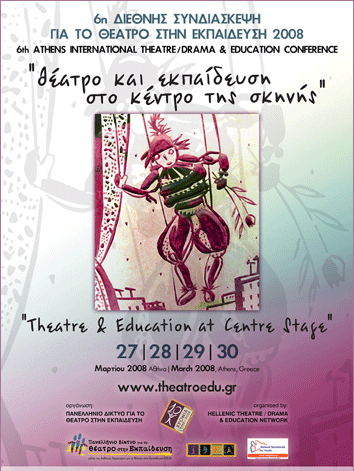 Conference 2008 – «Theatre & Education at Center Stage»
Conference 2008 – «Theatre & Education at Center Stage»
Society at the beginning of the 21st century is subject to groundbreaking changes.
Globalization and often commercialization of cultures and principles together with the weakening of the notion of community, which used to be a solid base for the formation of self-perception and belonging, have negative consequences in the life and development of many young people. The environmental problems, the violations of human rights and children's rights, social injustice, conflicts, conflagrations and forceful movement of people overshadow the impressive leaps of science and technology. What is the role theatre/drama can play in education in this context? What can it offer? What does research show happens when children and young adults participate in theatrical processes?
Even though the words theatre and drama was bequeathed to us by ancient Greek language and civilization, which considered theatre as education ("didaskalia"), we nowadays need to constantly struggle to remind this aspect of theatre. A struggle with obstacles, because while the pedagogical value and humanizing potential of theatre/drama in its various facets is recognized in theory, it seems to be underestimated in practice. For most planners of educational policy, the academic route in learning appears to be dominant and in many cases exclusive. Most of the formal educational systems, practically ignorant of old and new scientific theories on experiential learning, multiple intelligences and wholesome development of the person, are fixated on desk-based teaching and learning. Despite the rising disappointment and indifference of many students towards school, but also the increasing number of educators who are enthusiastic about the multiple benefits of theatre/drama in schools, most formal school curricula reflect the stance that knowledge is a bundle of information to be consumed principally for the acquisition of titles. However, practice proves that things are changing and that our role (of educators, academics, artists, facilitators, university and school students) as agents of change is definitive. We are aware that despite the positive developments in many countries we still have a long way to cover until we succeed in having theatre/drama play a central role in the young people's lives inside and outside school. Our love and passion for education and theatre have a lot to contribute towards this goal.
SEE MORE...